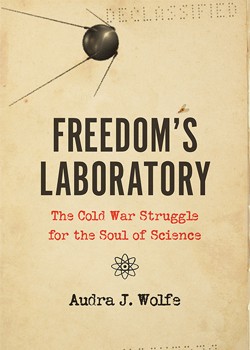

|
Project Troy: How Scientists Helped Refine Cold War Psychological Warfare
 [Atlantic] By working for the CIA, a crack team of researchers honed the United States’ first formal peacetime campaign of propaganda and manipulation. [Atlantic] By working for the CIA, a crack team of researchers honed the United States’ first formal peacetime campaign of propaganda and manipulation.The phrase Cold War didn’t always refer to a time period. In the late 1940s and early 1950s, the very years that the battle lines between the United States and the Soviet Union were being drawn, U.S. foreign-policy strategists used the phrase to invoke a specific kind of conflict, one carried out by "means short of war." If, as NSC-68, a key document of U.S. strategy, asserted in 1950, the United States and the Soviet Union were locked in an ideological clash of civilizations, a battle between "slavery" and "freedom," a victory by force would be hollow. If the United States wanted to defeat communism, it needed to do so "by the strategy of cold war," combining political, economic, and psychological techniques. "The cold war," NSC-68 warned, "is in fact a real war in which the survival of the free world is at stake." This was a new kind of conflict requiring new kinds of weapons: psychological weapons. The question of psychological warfare preoccupied a small but influential group of foreign-policy officials during President Harry S. Truman’s second term. By the time that Truman left office in January 1953, the United States had laid the legal and institutional foundations for overt propaganda campaigns as well as covert action. During that period of experimentation leading up to the Eisenhower presidency, almost anything U.S. strategists could dream up, short of overthrowing foreign governments (that would come later), was up for discussion. Among other things, the Marshall Plan allotted $13 billion to rebuild Western Europe, Voice of America transmitted jazz and news to listeners in 46 languages in more than a hundred countries, and the CIA sent tens of thousands of balloons filled with anti-Communist pamphlets into China. Even as State Department, CIA, and Army officials spent countless hours working through the administrative challenges of launching a psychological-warfare program more or less from scratch, they spent remarkably little time discussing what kinds of messages might best promote the cause of "freedom." Ideas about science rarely, if ever, explicitly appeared on lists of psychological-warfare objectives. Science entered U.S. psychological-warfare programs as a stowaway, tucked into the pockets of some of the private individuals to whom the State Department and the CIA turned to wage the United States’ battle against communism. More subtext than text, ideas about science subtly undergirded policy makers’ emerging plans for waging and winning this new kind of war. About the author: Audra Wolfe is a writer and science historian, and the author of Competing With the Soviets: Science, Technology, and the State in Cold War America and Freedom's Laboratory: The Cold War Struggle for the Soul of Science. Posted by: Besoeker 2018-12-01 |
| http://www.rantburg.com/poparticle.php?ID=528803 |